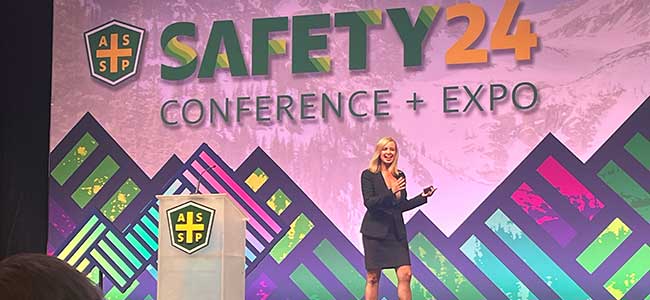‘De-Weaponizing’ Accountability to Change Culture
This week’s opening keynote speaker at ASSP’s Safety 2024, Jessica Kriegel, outlined a model for how organizations can make meaningful and lasting changes in safety culture.
This week’s opening keynote speaker at ASSP’s Safety 2024, Jessica Kriegel, outlined a model for how organizations can make meaningful and lasting changes in safety culture.
A primary obstacle in adopting safety practices is a “weaponized” approach to accountability and not clearly understanding what truly drives results, according to Jessica Kriegel, Ed.D., Chief Scientist of Workplace Culture at Culture Partners, who delivered this morning’s day one keynote address at the American Society for Safety Professional’s Safety 2024 event.
Speaking to a capacity crowd in the Mile High Ballroom at Denver’s Colorado Convention Center, Kriegel’s presentation, “Empower Your Teams With Positive Accountability,” focused on understanding why organizations’ culture changes often stall out, but also how to actually accomplish lasting, positive changes.
This begins with redefining accountability, she explains. In too many organizations, accountability correlates with being at fault rather than something positive.
“Accountability is a personal choice to focus on what you can control and take the steps necessary to drive key results,” she said. “That flips the script entirely, and it de-weaponizes accountability because it’s not about you and me and holding each other accountable and who’s responsible for this, but it’s about a personal choice.”
Kriegel explained this concept in tandem with a model she referred to as the Results Pyramid. The pyramid has four levels:
As the pinnacle is the Results level, which is the goal an organization is trying to achieve. The next tier is the Actions level, which are the actions and strategies an organization implements to achieve its results.
However, most organizations get stuck as what Kriegel referred to as the “Action Trap,” in which organizations successfully implement actions and see results, but don’t truly change their culture in ways that can achieve dramatic improvement because they don’t address the two other levels of the pyramid.
Those levels are the Beliefs level and the Experiences level. Those two levels are what change people’s mindsets about accountability. The Beliefs level describes how people feel about the Results that they are trying to achieve; it is their level of accountability. The Experiences level is what drives their beliefs; it is the first- and second-hand experiences, observations and lessons that shape their beliefs.
“If you really want to create a culture of accountability, you have to stop people about the action that you want them to take and go deeper to the belief level,” Kriegel told attendees. “What do they believe and what experiences can I create for them that will get them to believe what I need them to believe in order to take the action that will get us the result?”





